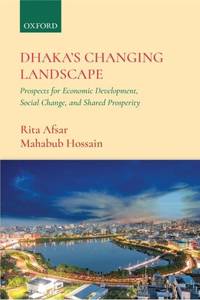Only logged in customers who have purchased this product may leave a review.
Sale!
Dhaka’s Changing Landscape (Hardback) | Released: 28 Mar 2020
By: Mahabub Hossain (Author) Publisher: Oxford University Press, USA26.00% Off Original price was: ₹ 1,595.00.₹ 1,180.00Current price is: ₹ 1,180.00.
You save ₹ 415.00
The book is about residents of Dhaka: migrant and non-migrant, poor and non-poor, men and women, young and old. It is about how they have experienced the city’s rapid transition for the two decades between 1991 and 2010 in terms of quality of life and livelihoods, and their prospects for... Read More
In stock
Ships within 1-2 Business Days
100% Orginal Books
Easy Replacement
Certified product
Secure Checkout
On time delivery
Author:
Mahabub Hossain
Publisher Name:
Oxford University Press, USA
Language:
English
Binding:
(Hardback)
About The Book
The book is about residents of Dhaka: migrant and non-migrant, poor and non-poor, men and women, young and old. It is about how they have experienced the city's rapid transition for the two decades between 1991 and 2010 in terms of quality of life and livelihoods, and their prospects for a shared future. It is not so common to come across urban studies based on longitudinal data largely due to the high mobility of urban households. Over the 20-year period, the city's population more than doubled and reached double digit figures at 15 million. At the same time, its contribution to the national economy almost trebled from 13 per cent to 36 per cent. An unmistakable trend of economic growth is evidenced along with the rapid decline of urban poverty and a downward trend in inequality in the country during the same reference period. At the other end of the spectrum are the environmental challenges in the context of high density and Dhaka's worst livability ranking. The book answerssome of the doubts generated by these contradictory signals of rapid urbanization: is the poorer segment of urban population that migrates with dreams for better lives and livelihoods benefitting from positive economic trends? Are these benefits sustainable in the long run? Have these benefits brought qualitative changes creating scope for this group to have a stake in the city's growing prosperity like their non-poor counterparts?About the Author: Rita Afsar, Research Fellow (Hon), Faculty of Arts, School of Social Sciences, University of Western Australia, Mahabub Hossain, Advisor, Executive Director, Bangladesh Rural Advancement Committee (BRAC), Dhaka, Bangladesh Rita Afsar is Research Fellow (Hon), Faculty of Arts, School of Social Sciences, University of Western Australia.Mahabub Hossain was Advisor to Executive Director, Bangladesh Rural Advancement Committee (BRAC), Dhaka, and distinguished professor and chair, Department of Economics and Social Sciences, BRAC University Mahabub Hossain was Advisor to Executive Director, Bangladesh Rural Advancement Committee (BRAC), Dhaka, Bangladesh, and chairperson of BRAC University's Department of Economics and Social Sciences.


Reviews
There are no reviews yet.